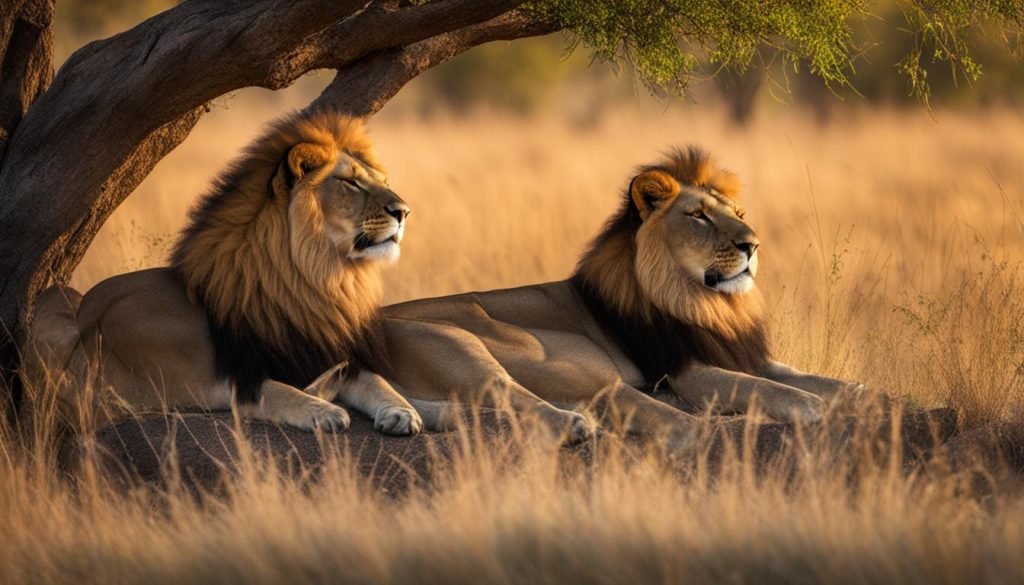Where Do Lions Sleep?
Have you ever wondered where do lions sleep? These majestic creatures can be found napping in a range of locations, including dense bushes, flat rocks, and even tree branches. Understanding lion sleeping habits and locations is crucial for their conservation and our understanding of their behavior.
Keep reading if you want to know more about the unique sleeping habits and patterns of lions, their preferred resting places, and the factors that influence their choice of sleeping locations. We will also delve into the importance of lion denning behavior and how it plays a crucial role in their sleeping habits.
Key Takeaways:
- Lions sleep in a range of locations, from dense bushes to tree branches.
- Understanding lion sleeping behavior is important for their conservation and understanding their behavior.
- Lion-denning behavior plays a significant role in their sleeping habits.
- The factors that influence their choice of sleeping locations include safety and comfort.
- Conservation efforts are essential to preserve their natural sleeping patterns.
Understanding Lion Sleeping Habits

Lions sleep between 16 to 20 hours a day, making their sleeping habits a significant aspect of their behavior. These creatures have specific sleep patterns and behaviors that ensure their survival and well-being.
During the daytime, lions can be found resting in the shade. Their sleeping patterns typically involve napping for a few hours, followed by waking up to scan their surroundings for any potential threats and napping again. According to researchers, lions tend to sleep for longer periods during the daytime, while being more active at night.
When it comes to sleeping locations, lions can sleep anywhere, but they prefer to rest in protected areas that provide cover from predators and the harsh sun. These places may include bushes, rocks, and caves, and they are typically located near their hunting territories.
In captivity, lions do not exhibit the same sleeping patterns as those in the wild. Due to being in a controlled environment, they may spend more time awake, and their sleeping habits may differ. Moreover, human activities and disturbances can disrupt their natural sleeping patterns and cause stress among these animals.
Overall, understanding lion sleeping habits is crucial for their welfare and survival. By studying their sleeping patterns and behaviors, researchers can design better conservation strategies to protect these majestic creatures for generations to come.
The Importance of Lion Resting Places

Lions are known for their long hours of sleep, and they require specific resting places to ensure their safety and well-being. These resting places not only provide protection but also offer a sense of comfort to these majestic felines. The resting places can vary depending on several factors, including the lion’s sleeping locations and sleeping habitat.
The choice of resting place is strongly influenced by the surrounding environment and any potential dangers that may be present. Factors such as the availability of shade, protection from the elements, and the proximity of prey all play a role in determining where lions choose to rest.
One of the essential aspects of lion resting places is their role in lion sleeping habits. Lions often sleep for up to 20 hours a day, and a safe and comfortable resting place is crucial for their overall well-being. These resting places can range from a simple grassy spot to a more elaborate den.
It’s important to note that human activities can have a significant impact on lion resting places. Lions in the wild are facing multiple threats, including habitat destruction and fragmentation, which can limit their access to suitable resting places. Conservation efforts are critical to preserving lion resting places and ensuring the survival of these majestic animals.
In conclusion, lion resting places are of utmost importance to ensure the safety and well-being of these magnificent animals. Understanding the factors that influence their choice of resting places can aid in preserving and providing suitable habitats for lions to survive and thrive.
The Role of Lion Dens in Sleeping

While lions can sleep anywhere, they often seek dens for safety and protection, particularly in the wild. Lion denning behavior is a crucial aspect of their sleeping habits, and the dens serve different purposes for lions depending on their gender and life stage.
For instance, lionesses use dens for birthing and rearing their cubs, while male lions use dens primarily for shelter and protection during harsh weather conditions or when nursing injuries. Additionally, dens provide a haven for lionesses and their cubs from male lions, who may attack and kill the cubs to bring the females back into estrus.
The importance of dens for lions in the wild cannot be underestimated, for it not only provides them with a safe and secure place to rest, but it also allows them to protect their offspring and strengthens the bond among pride members.
Where Do Lions Sleep?

Wild lions are known to inhabit a wide range of habitats, including grasslands, savannas, and scrublands. Their sleeping locations may vary depending on the habitat they live in and the factors that influence their choice of sleeping spots in the wild. Unlike captive lions, wild lions usually don’t have a designated sleeping area, but rather select locations that provide adequate shelter and safety from predators.
Wild lions have various sleeping habits in the wild that are influenced by their natural behavior and their habitat. Sleeping patterns can vary depending on factors such as the time of day, the amount of available food, and the weather conditions. For instance, lions may sleep more during the daytime in hotter seasons and spend more time awake during the cooler seasons.
Due to their territorial nature, wild lions may choose to sleep and rest in specific areas that are familiar and where they feel safe. These areas may be located under the shade of trees, in thick bushes, or rocky outcrops, depending on the region. Some lions may even choose to sleep in shallow pits or in tall grass to blend in with their surroundings and avoid detection.
It is worth noting that the sleeping habits of wild lions are not fixed and may change depending on various factors such as environmental disturbances, human activities, or hunting pressure. Thus, it is crucial to preserve the natural habitats of wild lions and limit human interference to help maintain their natural sleeping patterns.
Preferred Sleeping Territories of Lions
Lions are territorial animals that establish areas where they feel safe and comfortable. These territories may include various lion sleeping locations, such as rocky outcroppings, tall grasslands, or dense forests, depending on the lion’s habitat.
The factors that influence lion-preferred sleeping locations are complex and varied, but they often include a combination of available food sources, water sources, and shelter, as well as a lack of disturbance from other predators or humans. Lions may also choose sleeping locations that offer a high vantage point, allowing them to monitor their territory and detect any potential intruders.
Human activity can disrupt lion sleeping habitats, as it may lead to habitat loss, decreased prey populations, and habitat fragmentation. As such, it is crucial to protect the remaining lion’s resting places and habitats through conservation efforts, such as protected areas and wildlife corridors.
Natural Elements Lions Utilize for Sleeping
Lions are masters at finding the perfect spot to rest and recharge during the day. They use natural elements in their environments to create the ideal sleeping habitat.
One such element is the shade of trees, which provides cool and comfortable sleeping locations, particularly during times of intense heat. Lions also utilize large rocks or boulders, which provide shelter from the wind and rain, thus keeping them warm and dry. In some cases, lions have been observed using crevices in the rocks or hollow tree trunks as sleeping spots.
In addition, lions may dig holes in the ground or use existing dens to create comfortable resting places. Dens are particularly useful during the breeding season or when a lioness has cubs to protect. These dens provide a safe and secure environment to protect lion cubs from predators.
Overall, lions are opportunistic creatures that use their environment to create the perfect sleeping location. From digging holes to using natural shelters, lions have adapted to make the most of their surroundings.
“Lions are masters at using their environment to create the perfect sleeping location.”
Sleeping Habits of Male and Female Lions
Male and female lions possess different sleeping patterns and habits that are influenced by several factors such as their role in the pride, age, and overall health. For instance, the dominant male lion may require more sleep to replenish his energy after long periods of mating and fighting with other males. On the other hand, female lions who are mainly responsible for hunting and feeding the pride may have less sleep compared to males.
According to a study published in the Journal of Zoology, female lions in Serengeti spent approximately 8.2 hours per day sleeping while males spent 6.2 hours per day sleeping. The study also revealed that all lions have a strong preference for sleeping during the day, with peak sleeping time occurring at midday in some pride.
A fascinating difference between male and female lions is their choice of sleeping location. Female lions often rest in dens while males tend to sleep out in the open or a shady area. The choice of sleeping location for male lions is primarily influenced by their need to monitor and protect their pride from potential threats.
In conclusion, while male and female lions share many similar sleeping habits, they also exhibit distinct differences in their sleep patterns and location preferences. Understanding these differences can help us gain insight into the complex social dynamics of lion prides and their daily routines.
Sleeping Habits of Lions in Different Seasons
Lions’ sleeping habits vary in different seasons and conditions to adapt to their environment. During the hot summer months, lions rest during the day when the temperature is high and hunt at night when the temperature is cooler. In contrast, lions sleep more during the colder winter months, preserving their energy and warmth.
In addition to seasonal temperatures, rainfall is another significant factor in lion sleeping patterns. In areas where there is abundant rainfall, lions may rest more often because their prey is more abundant, and they do not have to wander far to hunt for food.
Moreover, in areas where there is less rainfall, lions may need to trek long distances to find prey, expending more energy and sleeping less. Furthermore, during the dry season, water scarcity may force lions to stay near water sources, influencing their sleeping locations.
Hence, depending on the season, rainfall, and feeding habits in their habitat, lions adapt their sleeping behavior to fit their needs. By understanding their sleeping patterns in different seasons, we can better understand how lions survive and thrive in their environment.
Human Impact on Lion Sleeping Habits
Humans have a significant impact on lion sleeping habits and behavior.
Activities such as tourism, encroachment on lion habitats, and poaching can cause severe disruptions in the sleeping patterns of these majestic felines.
Tourists often visit national parks and reserves to view lions, causing disturbance and noise in their natural habitats. This can make lions more restless, reducing the quality and duration of their sleep.
Lion habitats are also under threat from human encroachment. As human settlements expand into previously undisturbed areas, lion territories are shrinking, leading to increased competition, stress, and disruptions in their sleeping patterns.
Poaching is another activity that can deeply affect lion sleeping behavior. Poaching for lion parts, such as bones, skins, and claws, reduces the lion population, affecting their conservation, and also causes widespread fear and anxiety amongst lions, leading to increased vigilance and reduced sleep.
In conclusion, human activities can have a severe impact on lion sleeping habits and behavior, affecting their health, fitness, and ultimately, their survival. It is crucial to preserve their natural sleeping patterns and reduce human disturbances in their habitats through increased conservation efforts.
More About Lions:
- How Long Do Lions Live? Wild vs Captivity
- How Long Do Lions Live? Wild vs Captivity
- How Do Lions Communicate With Each Other?
- How Fast Can Lions Run?
- Can Lions Swim? Lion’s Swimming Ability Examined
- How Do Lions Mate? – Lion Reproduction
- Cannibalism in Lions: Do Lions Eat Other Lions?
- How Long Are Lions Pregnant? Gestation Period
- Do Lions Hibernate During Winter?
- How Big Can Lions Get? Lion Size Chart
- How Much Do Lions Weigh? Lion’s Weight Revealed







